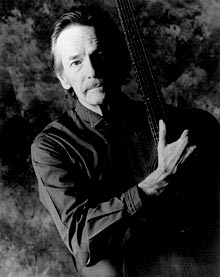In the view of legendary Canadian singer/songwriter Gordon Lightfoot, the folk-music revival was “really only in vogue for three years” before The Beatles burst on the music scene. And by the time folk superstar Bob Dylan hit, folk was already over.

“But several people established lifelong careers from that small window,” he tells Xpress. “The folk revival was so brief, but a lot of these people have hung on.” Lightfoot considers himself among this number, though it’s easy to argue that his songs reach far beyond the earnest innocence of Peter, Paul and Mary or Canadian duo Ian and Sylvia Tyson.
“I can see her lyin’ back in her satin dress / In a room where you do what you don’t confess,” he wrote in his 1973 hit, “Sundown.” There’s a delicious darkness to Lightfoot’s lyrics that speaks as much to the convoluted ways of the human heart as to Vietnam War-fueled disillusionment and angst. Lightfoot’s career began in the early 1960s, and by 1964 he’d been discovered by the Tysons, who—already big names in Canada—chose to record two of Lightfoot’s songs. That lead to Peter, Paul and Mary covering Lightfoot’s “Early Mornin’ Rain,” which was a success for all parties and led Lightfoot to the same management company representing Dylan.
“Since 1973, there’s a Canadian content ruling that they have to play Canadian artists on the radio,” Lightfoot explains. “Before that, if a song didn’t make it on the American charts, they wouldn’t play it in Canada.” The ruling came at the right time for the musician, but he was already a step ahead of the game. His hit “If You Could Read My Mind” climbed to No. 5 on American charts in 1971, proving his talent warranted international stardom.
And yet, Lightfoot doesn’t come off like a star. Soft-spoken and genial, he refers to the Rolling Stones and Rod Stewart as part of the “icon class” who play arena shows, while his own tour consists of concert halls. “It’s good enough for us and that’s all that matters,” insists Lightfoot, whose career highlights include six gold albums, five Grammy nominations and 17 Juno Awards (the Canadian equivalent of the Grammy). And, at age 69, he’s still playing about 50 dates per year.
It’s impressive to maintain a recording and touring career for more than 40 years—and even more so considering that five years ago, Lightfoot suffered a burst artery in his abdomen during a concert and was comatose for six weeks. During his recovery, the musician turned to what he knew best: recording songs. Though he had fulfilled his contract with longtime label Warner Bros., he had a backlog of unrecorded songs, from which he culled his 20th album, Harmony (2004). He’s been back on the road since 2005.
Lightfoot’s Asheville stop is one of 11 shows on a tour he describes as “revitalizing.” “Well-organized tours are very satisfying,” he notes. “I enjoy being in the studio, too, but my first choice always was performing because that’s what I did for three or four years before I got my first recording contract.”
And, in fact, no new albums are on the horizon. Lightfoot says he no longer wants to isolate himself the way he needs to for writing and producing. While he points to the 15 years between 1970 and 1985 as his “big years,” he also notes that that highly productive era took a personal toll on both his health and family life. Now that he’s finished his contractual obligations, Lightfoot says he’s happy to be enjoying life in Toronto, Ontario.
“These days, there are hundreds, maybe even thousands of people just on the edge of making it” in the music business, he says. “There weren’t as many people and there wasn’t as much competition” when he was getting started. As a senior troubadour of the folk-rock movement, Lightfoot seems content to play shows here and there and thank his lucky stars he’s not trying to break into an increasingly tech-driven music world. His main focus these days, he says, is remaining enthusiastic and putting on a good show. And with enough chart-topping hits to stock a performance, that’s not hard to do.
Lightfoot notes that his songs bring back a lot of memories for the audience as well as for the man behind the music. “Some of the memories you don’t want to recall,” he reflects, “but you take the good with the bad.”
who: Gordon Lightfoot
what: Legendary Canadian folk artist
where: Thomas Wolfe Auditorium
when: Tuesday, Feb. 12. 8 p.m. ($39 and $49. 251-5505)



Does the Thomas Wolfe do student rush tickets for non-ASO performances? I love me some Gordon Lightfoot, but $39 is a little rich for my blood…
Also, I think “Sundown” came out in 1974.
I have orchestra seats. Hope you can make it.